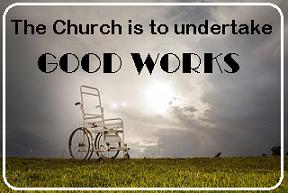Outreach: Precursor to Evangelism
Outreach: Precursor to Evangelism
In a previous article (APC NEWS, Issue 114, Nov/Dec 2005) I looked at five hindrances to evangelism that Reformed congregations often experience.
The purpose of the present article is to offer some suggestions as to how we might mitigate the hindrances. In addition, we will touch very briefly on some basic but profitable ways in which we can conduct outreach as communities of believers, in order to sow good will and to create a firm foundation for future evangelism.
Before proceeding though, let us just take a moment to reach a clearer understanding of the relationship between outreach and evangelism. For the purpose of this article, I define outreach as a set of various activities intended to help the members of one’s extended community (especially the needy). In other words, outreach is simply anything we do to love our neighbour (do being the operative word). However, outreach is legitimately a kind of precursor to evangelism as well. If we believe that the proclamation of the Good News is the best way we can love our neighbour, then it behoves us to use what means we have at our disposal to ensure that the elect in our communities have the opportunity to hear the gospel. Outreach helps that to happen.

However, never should we attach any strings to our outreach. We should never deny assistance, for example, because someone refuses to come to bible study or worship services on the Lord’s Day. To do so would be tantamount to betrayal of trust.
To continue, let us look at what we might do to mitigate or counteract the hindrances in our congregations and how, in general terms, we might go about the task.
What We Must Do⤒🔗
Hyper Calvinism: We must realize that while the gospel call goes out to all and sundry yet is efficacious for God’s elect only, we do not know who are the elect, nor when they shall be changed by God’s efficacious call. This realization will make evangelism possible, but not automatic. The only way to overcome this hindrance, therefore, is to understand God’s heart for the lost and open ourselves up to His love so that we too develop such a heart. It is also very important we understand that the term ‘lost’ is a relative one. That is, it describes both the unrepentant reprobate as well as one who is elect but not yet regenerated.
Covenant Succession: Once we realize the efficacious gospel call goes out to God’s elect who are hidden in the world just as much as in the womb and so come to acknowledge the Great Commission, we are able to accept the necessity of evangelism.
How We Might Do It←⤒🔗
We might devote ourselves, either privately or corporately, to an extended time for the study of significant passages of God’s word dealing with His love, mercy, and compassion for sinners. We should do the same for His Covenant; with the goal of understanding that the Covenant is a bond or relationship between God and His people in Christ, both the found and the lost (or the not yet found). A couple of passages concerning this and upon which we might study and meditate with profit are Luke 15:11-32 and John 17:20.
We should pray for God to demonstrate the truth and reality of His words in our hearts and minds.
Finally, through our faith, we must put to work our passion for and knowledge of the lost among us, as is spoken of by the apostle James,
If a brother or sister be naked, and destitute of daily food, And one of you say unto them, Depart in peace, be ye warmed and filled; notwithstanding ye give them not those things which are needful to the body; what doth it profit? Even so faith, if it hath not works, is dead, being alone. For as the body without the spirit is dead, so faith without works is dead also.James 2:15-17, 26
Hence the need and duty of outreach.
What We Must Do←⤒🔗
Shame or Fear: Again, having realized the nature of the gospel call and that we too are called to labour in God’s harvest fields, we must encourage and exhort one another to do the will of God. Fear and shame may be ever with us but so too are God’s love and comfort. Trust in Christ, His person, His promises for us and His finished work, is the way to overcome our shame and fear.

Lack of Ability: We counter this hindrance through the knowledge that it is the Holy Spirit who does the converting within the sinner’s heart. In addition, having a clear and easily remembered presentation of the gospel can greatly help in this regard.
How We Might Do It←⤒🔗
The best way is to become involved together, as a community, helping each other, encouraging each other in our communal efforts (Ecc 4:9-12). It is best not to try to overcome our fear and shame alone or to judge one another’s efforts in the area of personal evangelism or to set benchmarks or targets for ourselves (which will almost inevitably lead to failure). Rather, we might use one or more of the techniques for outreach discussed below as the means for us to overcome our own fear or shame and to edify and encourage one another as brothers and sisters.
What We Must Do←⤒🔗
Gathered Congregations: Members come from widely dispersed locations and communities, so it is more difficult to form relationships and to do works of mercy in the community where the church building is located.
However, this does not necessarily prevent members from doing outreach in the same community in which their building is located. And too, members can work with their elders and Pastor in their home communities. This could be done by the church offering support in any number of ways (see below) to the member in his or her community. In this way, the member’s community becomes a kind of mission field and the member and his or her elders, the missionaries. Specific activities could be very similar to those in foreign mission fields.
How We Are To Do It←⤒🔗
To undertake successful local outreach and evangelism, it is important to have a permanent address. When you begin creating outreach programs in a community, people will of necessity begin to rely and depend on you being at a known location. This is especially true for the sick, the poor and the elderly, who lack the means to be in control of their own lives. This obviously can be a problem for a congregation that is renting its space and facilities.
One way around this limitation is to maintain a travelling presence through the use of one or more vans. Using clearly marked vans (which ideally would be ‘camperized’) a congregation can go out into the community to do outreach. This is called the ‘dispersed modal’ of outreach.
It is vitally important at the outset of any outreach you do, to identify your congregation. By this, I mean of course getting the name and address of your church out into the community. Equally important though, is to build up recognition within the community of who you are and what you have to give others.
This is often described as ‘raising your profile’. Are you a bunch of stuffed shirts that never say ‘Hello’ to people as they pass by your church on a Lord’s Day after the service? Do you have greeters on the street inviting people in to your worship service? Do you show an interest in those you may see on your way into the church, those who may be washing their cars, cutting their grass or just hanging out in someone’s front yard? If we want to do outreach, which as has been said is the precursor to evangelism, we must show ourselves as caring and approachable people, willing to help as opportunity presents itself.
Specific Means and Methods←⤒🔗
As I stated in my first article, ‘It is not my purpose here to offer any particular strategies or methods. This is really a matter for each congregation to decide. There are as many ways as there are members. Many ways have worked as the means to build relationships and trust with unbelievers within a given community. It is really the time, energy, vision, ingenuity, talent, creativity and commitment of a congregation’s members that are the limiting factors.’
It is also very important to remember that as Reformed Christians, we can do no better in trying to understand outreach ‘what it means and how we are to undertake it’ than to return to our Bible, the first and last word for our instruction (2 Timothy 3:16-17). The gospels, for instance, are full of incidents of Christ doing outreach, although He would not have called it such.

Two examples that come immediately to mind are the two separate episodes of feeding the five thousand and the four thousand with nothing but a few loaves and fishes. Now to be sure, these two episodes are not merely about outreach or even evangelism. Nevertheless, if we accept the definition of outreach given earlier ‘that it is demonstrating God’s love for a lost world’ then surely the feeding of hungry people must qualify. There are many other examples spread throughout the Bible. We only need to apply the definition as a kind of filter, and we will find all sorts of situations, especially in Christ’s own ministry.
Nevertheless, I believe that in all of them the common denominator is the relief of suffering, which is nothing more than the active application of God’s charity upon the object of that charity, suffering sinners.
Notwithstanding the above comments, there are different specific ways of presenting the message outside the confines of the worship service. Let us briefly look at a few, remembering these are suggestions only. We can do each of these activities in the church building or in each member’s community (depending on the support required, or available from the congregation as a whole. Many of our smaller congregations will not have the necessary support structure or the financial resources to mount extensive projects).
Food and clothing collection and distribution: Can be a very effective means for later evangelism. It can also be combined with the distribution of tracts (as people come to collect food and clothing, see last point). This kind of service will require either a central storage (in the church building) or a distributed storage (food kept at the members’ homes until called for distribution at the church). Food and clothing distribution, if done on a regular and extended basis, give an opportunity for participating members to build personal relationships with clients over time, getting to know about their families, concerns and so on.
Education or public lectures: Various workshops or courses such as our own congregation’s ‘ROOTS’ course. These may be similar to the popular Alpha program but obviously more biblically grounded and Reformed in theology. These work best when there is already a program of food and or clothing distribution in the congregation. The two types of outreach are mutually reinforcing. These types of programs are also more effective if a buffet style dinner is included. (Remember the thousands of followers who after being taught by Christ and had the word preached to them, were then fed with the loaves and fishes.)
Transportation services: While logistically difficult for small congregations, having a free way to get to a food bank, a doctor’s appointment or to other social service agencies is of particular benefit to the elderly and the ill or otherwise home bound (such as agoraphobics). Giving someone a ride presents a wonderful opportunity to get to know that person a little better, discovering his needs and sharing your own testimony and of course the Gospel.
However, never make your care receiver think for a moment that you have trapped him and are about to take advantage of his lack of control and his dependence on you.
Websites: The Internet and the Web are approaching ubiquity in North America and the British Isles. A congregational website should not pass up the opportunity to present the gospel (and its accompanying call to sinners). This can be in the form of simple text based content or in audio and streaming video clips. As well, there should be links to other sites and web resources for the visitor.
One obvious problem with the Internet and World Wide Web is the unfortunate fact that many people in society are unable to use this technology. Either they cannot afford a computer with an Internet connection or they do not know how to use the technology or both.
Information about the various outreach services provided by your congregation as well as a list of local social service agencies that operate in your community, could be provided on your website. This list does not have to be exhaustive but it should supply names, addresses, hours of operation and phone numbers for agencies able to supply assistance with such extreme needs as food, shelter and counseling that far too many people are in desperate need of in our society.
For instance, our own congregation (APC Vancouver) is starting an outreach ministry called Highways and Hedges, based on Luke 14:16-23. Part of this ministry will be a website with information about the services we offer, but also a listing of selected social service agencies serving the community of Vancouver East.
Sorry We Missed You: A sign and a place to hold simple blank request forms could be very helpful to the needy who come by the church building ‘after hours’. Most church buildings nowadays stand empty, unused and locked for most of the hours of a week. This is a shame, so having a way like this for people to contact you is worth considering. Once filled in, it is easy to slip through the mail slot.
Obviously having the name and phone number of the Pastor or another contact on a church sign displayed in plain view is a must, but giving strangers, who may be in need of specific help and unable to access a telephone, the ability to contact you in this way is a thoughtful alternative. An added benefit is that it helps portray your congregation as a caring one and puts a friendly face on the church which so often is viewed as cold, exclusive and hypocritical by unbelievers.

Others: Be creative. I recently read of one church in a large metropolitan area whose members, on cold winter nights, would use a van to deliver hot drinks and soup to patrons standing in a long line waiting to get into a movie! Two or three would take a tray of drinks up and down the line offering nothing more than the drinks; no message, no evangelism, just warm comfort on a cold night. When challenged by one annoyed patron who accused the good Samaritans of manipulating people into coming to church, they simply told him that all they were doing was what he saw them doing: demonstrating God’s love and compassion albeit in a small way. (It was because of this ministry that the writer started attending church and later came to know Christ as his Lord and Saviour.)
There was a ‘sandwich ministry’ in the church I attended before coming to the Vancouver APC. Once a month the Pastor would let the congregation know that he was looking for volunteers to come into the church kitchen, where they would make sandwiches from food donated by the local supermarkets and bought at a discount by the ministry organizers.
People would come to the kitchen and for about two hours on a Saturday evening would just make and wrap simple sandwiches. On the Lord’s Day after the morning service another team of volunteers would load the sandwiches along with two huge containers, one of hot soup and one of coffee, into a van. They would then drive it to the Downtown Eastside of Vancouver, the poorest and most drug-ridden neighbourhood in all of Canada.
There they would go to specific well-known locations and distribute the food. As opportunity presented itself, they would preach the gospel, pray, or otherwise bear witness. Did this ever bear fruit? In the two plus years my wife and I were members of this church we never heard of one person coming to Christ. Yet I know that this ministry is still going on.
Distributing tracts, pamphlets: This is a tried and true method for evangelism, not outreach, which in the fast paced and wired world of today can still be effective. The key is in regular and wide distribution. To be evangelical, the tract must not present reasons for coming to church (such as the opportunity to attend bible study, fellowship with others, or being engaged in various ‘works’ activities).
Rather the tract must clearly explain the underlying predicament of the unsaved and the only solution, which is God’s grace in and through Christ Jesus. I will have more to say about this in the third and final installment of this series.
These are but a few ideas. APC congregations in various locations are now undertaking these and other methods for doing outreach, and perhaps for presenting the gospel as well. However, I cannot stress enough that we must not allow our outreach activities to be seen by unbelievers as merely a ruse or pretence for evangelism.

The Church is to undertake good works as nothing other than sincere and honest expressions of her own faith and compassion for those in need, as well as of thankfulness and gratitude to God for giving the gift of grace through Christ. Notwithstanding, our efforts at outreach must have a two-fold goal: to help those in need in their immediate predicament and to offer the hope of a complete, sufficient and permanent answer to all of their problems in life. This only the gospel is able to accomplish.
Eventually, all our outreach must culminate in the proclamation of the simple, unadorned gospel. That, as they say, is where the rubber hits the road.

Add new comment